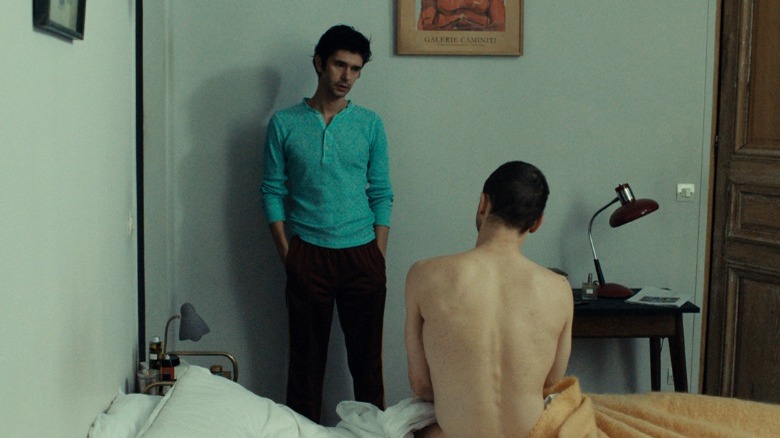Passages Review: The Sexy, Scintillating Sundance Standout [Sundance]
There's something indefinable about Franz Rogowski. The German actor has undoubtedly left his mark in the last few years, in exciting European films like "Undine," "Transit," and "Great Freedom." He's never over the top in ways that demand your attention — he can do that through sheer magnetism in ways that most performers can only dream of. Rogowski uses small, thoughtful details to embody his characters, making every character feel complete. He's particularly effective as a romantic lead, so effortlessly seductive in ways that make it believable that just about anyone could fall under his spell.
I can think of no better actor than Rogowski to embody Tomas, a frustrated filmmaker in Ira Sach's tremendous new film "Passages." The film begins with Tomas wrapping up shooting his latest movie. He's annoyed over the way a performer is descending a staircase, and Tomas' instructions are muddled to the point that the actor has no idea how to accomplish what is being asked of him. Sach's film immediately establishes Tomas as a man that knows what he wants, but absolutely no idea how to get it. While he's direct, he's plagued by indecisiveness that makes commitment difficult.
That's especially challenging for Tomas, as his impulses take over whenever he's wrapping a film, particularly when it comes to sexual desire. He's been married to his husband Martin (Ben Whishaw) for many years, and they share a beautiful apartment in Paris together (amongst other properties — money is not an issue here). But Tomas finds himself completely and utterly drawn toward Agathe (Adèle Exarchopoulos), who he meets at a nightclub that evening. The two begin a torrid affair, but it's no secret, as Tomas tells Martin the next morning without hesitation that he's slept with a woman. Martin is astonished, though judging by his remarks, he's far more surprised that Tomas slept with a woman than the fact that he slept with someone else.
He doesn't seem to have broken the rules of their relationship either. That doesn't stop Martin from hurting, though. He tells Tomas "You can pursue anything you want, but you can't dictate how I feel." It's a surprising moment, but it's one that tells you "Passages" has a much deeper understanding of romance and relationships than you might expect, and it's one of the reasons the film is so impressive.
It's no one-night stand either, as Agathe and Tomas fall for each other. They can't keep their hands off each other: in one especially scintillating sex scene, the two are so deep into the throngs of passion that they forget to even take their clothes off. As Tomas bounces back between Agathe and Martin, he's stunned to discover his husband has embarked on an extramarital affair of his own.
Thoughtful, provocative sex on screen
A portrait of a man who doesn't know what he wants and the irresistible pull he has on two people, "Passages" is an incredibly sexy film. There's a fascinating blend of misery and arousal that feels incredibly true to life, and its honest and authentic portrayal of love in all its forms tinged with sadness has a distinctly European bent — it's a movie that belongs in its Parisian setting. But it's far from your standard European art-house fare: this is a film that has a widespread appeal, particularly thanks to its fantastic performances and incredibly refreshing sex scenes.
There's a lot of conversation as to whether sex scenes really belong in film (an absurd take, but it's prominent), but "Passages" has some of the most memorable and effective sex scenes in cinema, reminding audiences that there's a sensitive, intelligent — and yes, sexy — way to show intimacy on screen. A scene between Tomas and Martin is the film's standout. Never once feeling exploitative, Sach's camera explores through a mostly still shot how two people that have been with each other for a long time understand each other's bodies in ways that people just meeting couldn't possibly know.
It's rare to see sex portrayed so beautifully, especially in same-sex relationships. It's a scene that will be talked about and dissected for ages — explicit without feeling pornographic, intimate, nuanced, sexual, and passionate. Hopefully, future filmmakers will look to "Passages" as a way to explore sex thoughtfully and exquisitely. Sex is an important part of life for many, and "Passages" understands that with a vital humanity.
Sach's film is so thoughtfully composed. Framing is delicate yet intricate: an extended sequence where Martin stands clothed over a shirtless Tomas, wrapped in a blanket looks like a painting, and their positioning highlights the challenging disbalance in their relationship that's coming apart at the seams, a far cry from their passionate moments together.
Tomas slowly unravels throughout the film, but it never culminates in a dramatic fight or a tear-struck screaming match that you might expect from a film that investigates modern relationships. "Passages" is far too invested in reality to do something like that. The film unravels slowly but methodically, and it's never boring as our characters size each other up and find themselves inexplicably unable to resist Tomas, despite him clearly being unable to decide which person he wants to be with.
Then again, maybe it's not so inexplicable. Both Whishaw and Exarchopoulos are wonderful and completely believable, but Rogowski is impossible to look away from, exuding such sexual and personal confidence, to the point that it makes complete sense why both Martin and Agathe can't stay away from him, despite his repeated (and constant) errors. This is Ira Sach's best film in years, a magnetic, emotional, and hugely watchable exploration of love and sex in the modern age. Those of us who've been following Rogowski for a while have been ready for this, and "Passages" might just be the film that makes him a superstar.
/Film Rating: 8.5 out of 10

